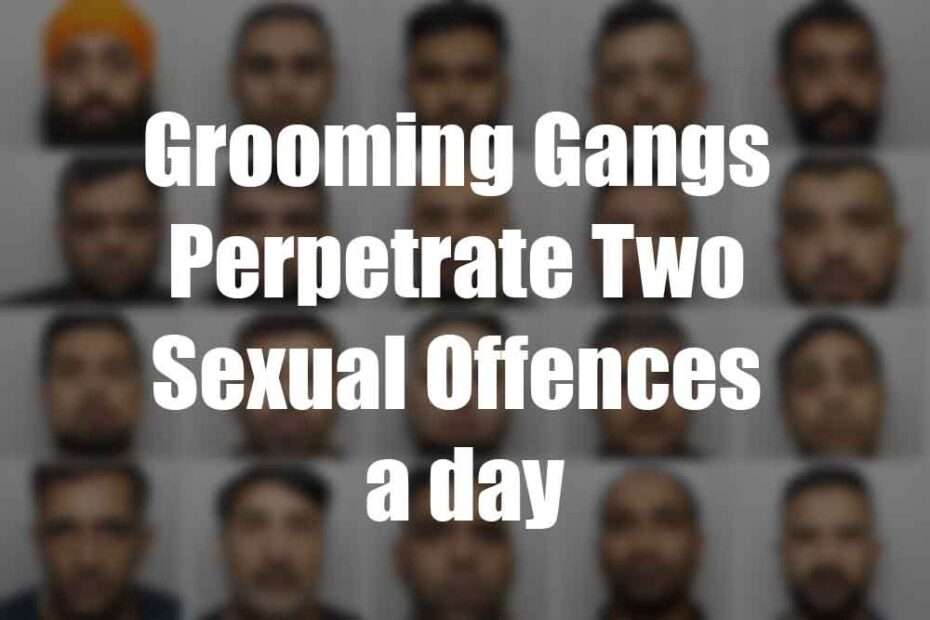Grooming Gangs Perpetrate Two Sexual Offences a day
Analysis of Police Data Across England and Wales Uncovers 572 Child ‘Grooming’ Crimes in Initial Nine Months of 2024
Newly released police data has revealed that grooming gangs are responsible for nearly two child sexual abuse offences each day reported to authorities. This groundbreaking analysis represents the first comprehensive examination of such crimes across the nation.
According to data collated from all 43 constabularies across England and Wales, law enforcement recorded 717 child sexual exploitation “grooming” crimes throughout 2023, with an additional 572 cases documented in the first three quarters of 2024.
These landmark statistics have emerged through the inaugural national police initiative to gather and scrutinise police-recorded “group-based” child sexual abuse, including detailed demographic information about perpetrators. The initiative, known as the “Hydrant Programme”, was established by police following criticism in Alexis Jay’s Independent Inquiry into Child Sexual Abuse, which highlighted the “widespread failure” to collect “good quality” data regarding abusers, victims, and the nature of offences.
Jay’s 2022 report emphasised that the absence of accurate data had fostered a “one-sided and often uninformed debate” regarding the ethnic backgrounds of perpetrators, whilst simultaneously hindering both the prosecution of offenders and the provision of support services for victims.
The issue has recently returned to the political spotlight following Labour’s decision to block an inquiry into the scandal. Sir Keir Starmer, who serves as Prime Minister, has faced particular scrutiny due to his former role as head of the Crown Prosecution Service during the height of the Oldham scandal in Greater Manchester. His party’s opposition to a national inquiry into grooming gangs has drawn significant criticism.
The comprehensive analysis reveals that “group-based” offending—defined as crimes involving two or more individuals—constituted 4,228 offences, representing 3.7 per cent of all 115,489 child sexual abuse and exploitation crimes, including those perpetrated online, throughout 2023.
Of these 4,228 group-based offences, 17 per cent—equivalent to 717 cases—were classified as “grooming gang” incidents involving child sexual exploitation. Familial abuse cases, where two or more family members were involved in abusing children, accounted for 26 per cent of the group-based offences.
Investigators have also identified a significant proportion of “other” cases, which encompasses child sexual abuse committed by other children—a concerning trend that police believe has been exacerbated by the proliferation of pornography on the internet and young people’s increasingly online-centred lifestyles.
Regarding the ethnic background of perpetrators, the majority—83 per cent—were identified as white, whilst 7 per cent were categorised as Asian, 5 per cent as black, and 3 per cent as mixed race. However, police officials have emphasised that these demographic breakdowns must be interpreted with caution, as they represent only 34 per cent of suspects, given that ethnicity can only be officially recorded following police interviews where individuals confirm their ethnic background.
Richard Fewkes, who serves as director of the Hydrant Programme, indicated that the data suggests the profile of offenders broadly mirrors the overall ethnic composition of the UK population. In his discussion with The Telegraph, he stated: “In very general terms, what we see across all group-based offending is that no particular ethnicity stands out based on population data.”
Fewkes acknowledged that police forces had previously allowed “cultural sensitivities” to impede investigations but emphasised that this was “absolutely not” the current situation. He elaborated: “Our point is that wherever a child is at threat, wherever a child has been abused, that response should be robust right the way across the board, whoever’s committed it, whatever colour their skin, whatever religion they are, the policing response should be robust.”
Historically, law enforcement and prosecutors often hesitated to act against groomers, who have been predominantly of British-Pakistani origin, due to concerns about potential accusations of racism or Islamophobia. Sir Keir addressed this institutional failing in 2012 during his tenure as director of public prosecutions, stating: “In a number of cases presented to us, particularly in cases involving groups, there’s clearly an issue of ethnicity that has to be understood and addressed. As prosecutors we shouldn’t shy away from that.”
However, Fewkes cautioned that the concentrated focus on “grooming gangs”—which represent a minority of offences even within group-based child sexual abuse—could adversely affect victims of other forms of abuse, potentially deterring them from coming forward. He explained: “We hear it directly from victims and survivors. Because if, let’s say, you are a victim of child sexual abuse within a family setting, which is our biggest threat, and you hear the narrative and the priority pushed by statutory agencies, and its focus is in one particular area, that has the impact of you thinking, ‘Well, I’m probably not going to be listened to because I’m not a priority.'”
He further warned that unbalanced media coverage was “triggering” for many victims, “because it is in essence bringing back to the fore their trauma from the abuse.”
The political response continues to evolve, with Jess Phillips, the safeguarding minister, recently indicating openness to a specific inquiry on child grooming should victims desire one, stating that “nothing is off the table.” This development followed the revelation that Phillips had previously declined to support an inquiry into abuse in Oldham, which prompted Kemi Badenoch, the Conservative Party leader, to advocate for a national inquiry.
The parliamentary response culminated in MPs voting 364 to 111 against the demand for such an inquiry, leading to accusations from the Conservative Party that Sir Keir had committed an “act of cowardice” in opposing the investigation.
This comprehensive data collection and analysis represents a significant step forward in understanding and addressing the complex issue of group-based child sexual exploitation, whilst simultaneously highlighting the challenges faced by law enforcement and support services in addressing this critical safeguarding concern.

